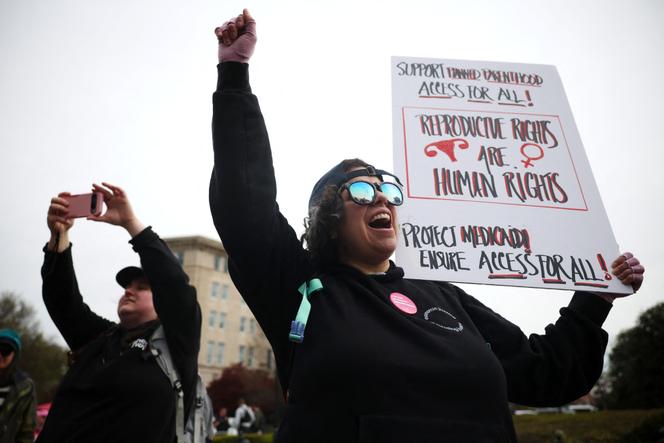
The majority conservative Supreme Court, which was endorsed, Thursday, June 26, the withdrawal by South Carolina from public funding to the organization of family planned Planned Parenthood, thus opening the way to similar decisions in other states hostile to the right to abortion.
The case does not relate directly to the right to abortion but to the freezing of funding to organizations that defend it. In question, a 2018 decision of the Republican governor, Henry McMaster, excluding Planned Parenthood from the Medicaid public health insurance program because of his participation in voluntary pregnancy interruptions (IVG).
The organization manages two clinics in the State where it provides care for low -income people thanks to the funding of Medicaid, such as medical examinations, cancer screening or chronic diseases such as diabetes, anemia or hypertension. These establishments also practice abortions, authorized only during the first six weeks of pregnancy in the state of southeast of the United States.
“Political and ideological reasons”
Planned Parenthood as well as a woman suffering from diabetes attacked the governor’s decision in court and obtained success, arguing that she raped a federal law authorizing a patient to be treated by the competent health service provider of his choice.
But the Supreme Court, dividing on ideological lines, the six conservatives against the three progressives, considers that the law does not allow an individual, in this case a patient, to challenge the exclusion of the Medicaid program of her doctor, clinical or hospital. “It is up to the elected representatives of the people and not to non -elected judges, responsible for applying the law as it is”to authorize such legal actions on the part of simple citizens, writes for the majority the conservative magistrate Neil Gorsuch.
On behalf of the three progressive judges, Ketanji Brown Jackson expressed his disagreement. “At least, this decision will deprive the beneficiaries of Medicaid of their only real appeal to enforce the law that Congress expressly granted them”she explains.
And beyond, “It will strip these inhabitants of South Carolina – and countless other beneficiaries of Medicaid in the country – of deeply personal freedom”that of the choice of their caregiver in a situation of vulnerability, deplores Ketanji Brown Jackson. “Although the immediate impact of this decision is limited to South Carolina, other states may decide to prevent people covered by Medicaid from accessing certain health providers for political reasons”a réagi Planned Parenthood.
The memorable world
Test your general culture with the writing of the “world”
Test your general culture with the writing of the “world”
Discover
“This judgment can potentially open the door to abuse of generalized power by states who would like to withdraw funding at approved clinics, for political and ideological reasons”also warns the Center for Reproductive Rights (center for reproductive rights). Its president, Nancy Northup, quotes in a press release the examples of establishments contributing to the control of births, or in particular caregivers the LGBT + or immigrants.
Joy of anti-EVG organizations
Democratic senator Patty Murray is alarmed “Catastrophic consequences for women across the country depending on Planned Parenthood centers for their essential care”.
“This attack on Planned Parenthood has no other reason than the desire for anti-abortion republican extremists to close access to abortion as much as they can, whatever the consequences”said in a press releaseme Murray, who sits on the Senate Health Commission.
The republican senator Lindsey Graham, on the contrary, congratulated that this decision allows “To South Carolina and other States to prevent Medicaid funding from organizations practicing abortion, including Planned Parenthood”.
This decision “Open the way to stop, by South Carolina and other states, funding from large abortion companies such as Planned Parenthood via their Medicaid programs”also rejoices SBA Pro-Life, one of the main anti-SIVG organizations in the United States.
By its historic judgment of June 2022 canceling the federal guarantee of the right to abortion, the Supreme Court has given states all latitude to legislate in this area. Since then, around twenty of them have banned abortion, whether carried out by medication or surgical, or have very strictly framed it.

